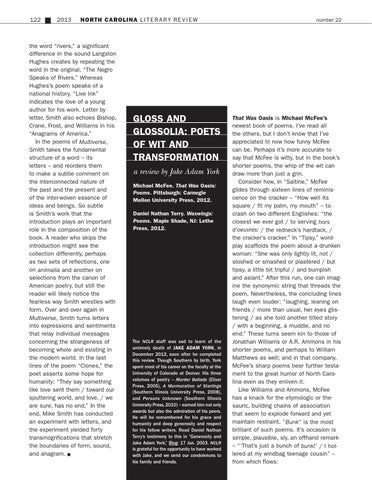122
2013
NORTH CAROLINA L I T E R A R Y RE V I E W
the word “rivers,” a significant difference in the sound Langston Hughes creates by repeating the word in the original, “The Negro Speaks of Rivers.” Whereas Hughes’s poem speaks of a national history, “Live Ink” indicates the love of a young author for his work. Letter by letter, Smith also echoes Bishop, Crane, Frost, and Williams in his “Anagrams of America.” In the poems of Multiverse, Smith takes the fundamental structure of a word – its letters – and reorders them to make a subtle comment on the interconnected nature of the past and the present and of the inter-woven essence of ideas and beings. So subtle is Smith’s work that the introduction plays an important role in the composition of the book. A reader who skips the introduction might see the collection differently, perhaps as two sets of reflections, one on animalia and another on selections from the canon of American poetry, but still the reader will likely notice the fearless way Smith wrestles with form. Over and over again in Multiverse, Smith turns letters into expressions and sentiments that relay individual messages concerning the strangeness of becoming whole and existing in the modern world. In the last lines of the poem “Clones,” the poet asserts some hope for humanity: “They say something like love sent them / toward our sputtering world, and love, / we are sure, has no end.” In the end, Mike Smith has conducted an experiment with letters, and the experiment yielded forty transmogrifications that stretch the boundaries of form, sound, and anagram. n
Gloss and Glossolia: POETS OF WIT AND TRANSFORMATION a review by Jake Adam York Michael McFee. That Was Oasis: Poems. Pittsburgh: Carnegie Mellon University Press, 2012. Daniel Nathan Terry. Waxwings: Poems. Maple Shade, NJ: Lethe Press, 2012.
The NCLR staff was sad to learn of the untimely death of Jake Adam York, in December 2012, soon after he completed this review. Though Southern by birth, York spent most of his career on the faculty at the University of Colorado at Denver. His three volumes of poetry – Murder Ballads (Elixer Press, 2005), A Murmuration of Starlings (Southern Illinois University Press, 2008), and Persons Unknown (Southern Illinois University Press, 2010) – earned him not only awards but also the admiration of his peers. He will be remembered for his grace and humanity and deep generosity and respect for his fellow writers. Read Daniel Nathan Terry’s testimony to this in “Generosity and Jake Adam York,” Blog: 17 Jan. 2003. NCLR is grateful for the opportunity to have worked with Jake, and we send our condolences to his family and friends.
number 22
That Was Oasis is Michael McFee’s newest book of poems. I’ve read all the others, but I don’t know that I’ve appreciated til now how funny McFee can be. Perhaps it’s more accurate to say that McFee is witty, but in the book’s shorter poems, the whip of the wit can draw more than just a grin. Consider how, in “Saltine,” McFee glides through sixteen lines of reminiscence on the cracker – “How well its square / fit my palm, my mouth” – to crash on two different Englishes: “the closest we ever got / to serving hors d’oeuvres: / the redneck’s hardtack, / the cracker’s cracker.” In “Tipsy,” wordplay scaffolds the poem about a drunken woman: “She was only lightly lit, not / sloshed or smashed or plastered / but tipsy, a little bit tripful / and bumpish and aslant.” After this run, one can imagine the synonymic string that threads the poem. Nevertheless, the concluding lines laugh even louder: “laughing, leaning on friends / more than usual, her eyes glistening / as she told another tilted story / with a beginning, a muddle, and no end.” These turns seem kin to those of Jonathan Williams or A.R. Ammons in his shorter poems, and perhaps to William Matthews as well; and in that company, McFee’s sharp poems bear further testament to the great humor of North Carolina even as they enliven it. Like Williams and Ammons, McFee has a knack for the etymologic or thesauric, building chains of association that seem to explode forward and yet maintain restraint. “Bunk” is the most brilliant of such poems. It’s occasion is simple, plausible, sly, an offhand remark – “‘That’s just a bunch of bunk!’ / I hollered at my windbag teenage cousin” – from which flows:
